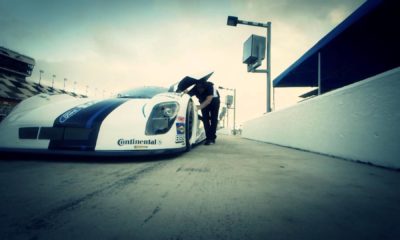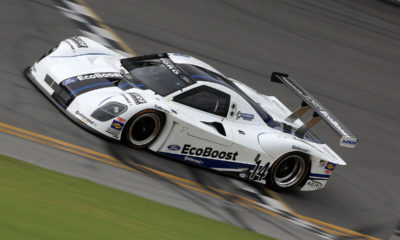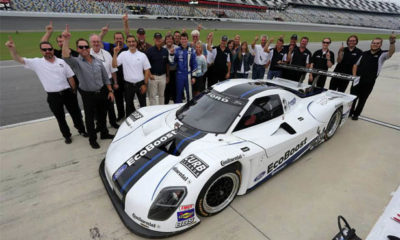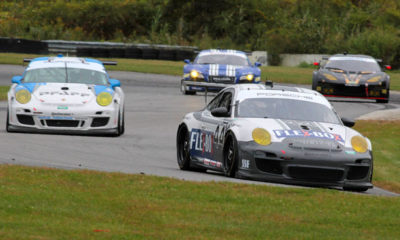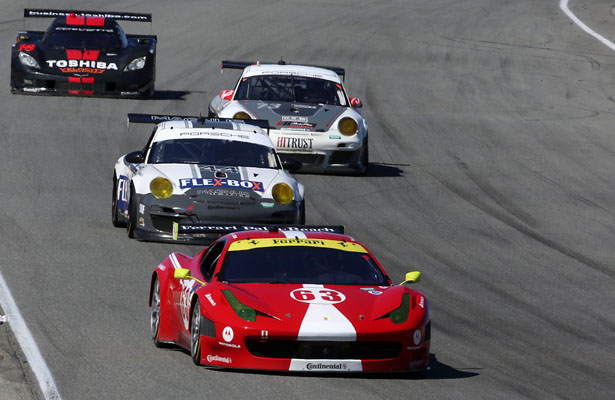
Photo: Brian Cleary/GRAND-AM
The penultimate round of the Rolex Sports Car Series at Mazda Raceway Laguna Seca delivered plenty of action on the track, but it was a ruling, issued by GRAND-AM nearly five days following the checkered flag, that had the paddock buzzing afterwards.
Last Friday, the official results for the Continental Tire Sports Car Festival were released, listing a pair of post-race penalties issued to the No. 31 Marsh Racing Corvette and No. 73 Park Place Motorsports Porsche, which were involved in separate, late-race incidents with the No. 63 Scuderia Corsa Ferrari, while battling for the final podium position in GT.
Both the Nos. 31 and 73 cars, which initially finished third and fourth in class, had 22 seconds added to their race time, equivalent to the time to serve a drive-through penalty, for contact resulting in overtaking. The ruling elevated the championship-contending No. 63 Ferrari to a points-paying third place finish, fueling conspiracy theories of why it took nearly a week to announce and if the penalties were given to aid the Ferrari’s title chase.
That’s not the case, according to GRAND-AM Race Director Paul Walter, who, in an exclusive interview, says the penalties had already been decided post-race, per standard protocol, but a series of events delayed the official release by a number of days.
“I communicated that fact to both parties after the race,” Walter told Sportscar365. “Not only did I email the competitors, that I wanted to speak to them, and they unfortunately had already left the track and I did not get the opportunity to do so personally, I also at the same time emailed our timing department to say, ‘Please prepare a result with the application of these penalties but do not release it publicly until I have the opportunity to speak with the competitors.'”
Walter said he initiated talks with some of the competitors the following day, but it took until Thursday to have conversations with everyone involved. Once those were made, he said, the ruling was made final and the official results were subsequently released. He said the late issue of the penalties were an unintended consequence, and in no way tied to an undecided ruling.
“Since the close of the event and my original emails, I’ve traded extensive emails, a number of lengthy telephone conversations with all parties involved and they raised the same concerns about the perception of releasing the results late,” Walter admitted. “I’ve gone to great lengths to outline the process, specifically in what was done in this case.
“I made very, very clear to each of them individually of what has occurred and why things are the way that they are. I don’t disagree that we can continue to work to make things better, but certainty I think we’re in a position where with the way this situation transpired is largely due to unintended consequences rather than anything else.”
A longtime IMSA official, which included full-time ALMS Race Director duties since 2012, Walter took over as GRAND-AM Race Director this year, part of a significant staff overhaul heading into the Tudor United SportsCar Championship.
Walter’s arrival in the Rolex Series has resulted in a mirrored officiating procedure seen in the ALMS, where rulings for incidents occurring in the final few laps of each race are typically not made until post-race.
A recent example came in July’s ALMS race at Lime Rock Park, where the Level 5 HPD of Ryan Briscoe was penalized post-race for avoidable contact with the then-class leading ESM car of Guy Cosmo.
Briscoe went on to win the race, celebrate on the top step of the podium with team owner Scott Tucker, but for the car to be handed a penalty for avoidable contact less than two hours after the checkered flag, which relegated he and Tucker to 4th place points.
“Ideally, we’ll solve everything we have to solve during the race, before the checkered flag drops, we’ll make all of our announcements before everybody takes their headsets off and then there’s nobody to go and see and nobody to follow up with,” Walter said.
“That doesn’t always happen, for whatever reason, but the process itself in terms of trying to afford the competitor the same courtesy that we would for anyone else, to have that notification made personally, I think that would be consistent. I’ve done that for years.”
Looking to the future, Walter remains open to new ideas that could strengthen the officiating structure of the series. “I think it’s a fundamental basis of what we do,” he said. “There’s always evolution and we always take feedback from competitors, interested parties, ourselves. We’re always looking to improve, no matter how good any event or any circumstance is.”



















